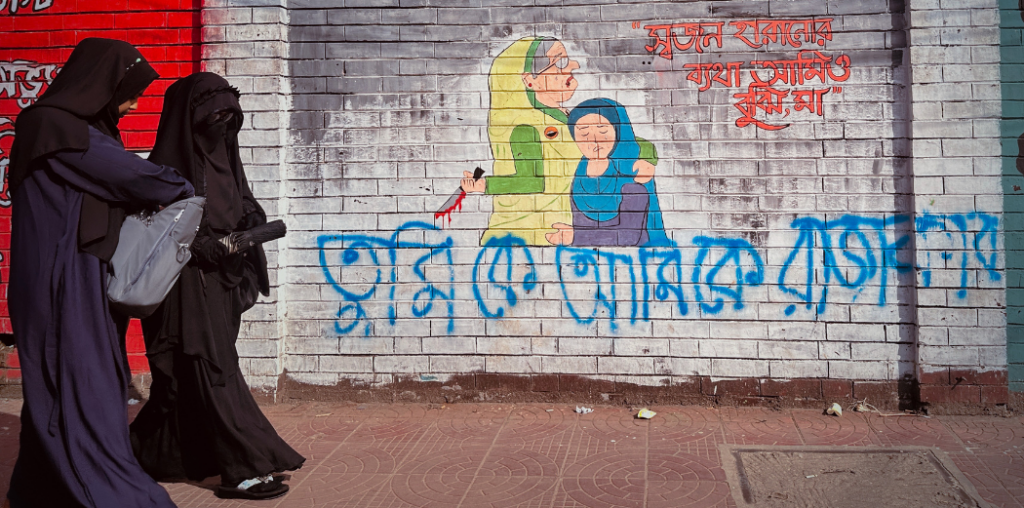
It was nothing like we had imagined — fearing we might be targeted by Bangladeshi citizens because of our Indian identity or because we are non-Muslims.
The first surprise was how smoothly we got our journalist visas from the Bangladesh High Commission in Delhi, and the smiling faces and warm gestures of the immigration officers at Dhaka airport.
In Dhaka, what we experienced was the vibrant life — busy markets, children heading to school, packed restaurants, traffic jams. Often, walking alongside locals through narrow lanes and alleys turned out to be the fastest way to get around. Occasionally, people would politely ask, “Your country name?” Upon learning we were from India, they’d simply smile and say, “Good.”
The biggest challenge turned out to be the language barrier, not our religious identity or nationality. We could speak just a couple of sentences in their language, thanks to ChatGPT: “Ami Bangla boli na. Apni English kotha bola jana?” (I don’t speak Bangla. Do you speak English?).
Despite the challenges, we managed to meet and spend time with local journalists, student protest leaders, officials from the interim government, leaders of the Bangladesh Nationalist Party (BNP) and members of minority communities. Luckily, many of them responded with a “yes” to “Apni English kotha bola jana?”
From our conversations with them, three strong points emerged that contradicted the alarming reports of rising Islamism in Bangladesh — reports that could benefit the ousted Awami League by discrediting the opposition and justifying its authoritarian tactics. By framing the political turmoil as a threat to secularism and minority rights, the Awami League and its supporters might be aiming to maintain support from international partners, we suspected.
Before we dive into the three points, let’s quickly lay out the context.
On June 5, the Supreme Court of Bangladesh overturned a 2018 government decision that had eliminated a 30% civil service quota for descendants of freedom fighters. By July 1, students rallied under the Anti-Discrimination Students’ Movement banner, and began organising widespread demonstrations and sit-ins throughout Dhaka.
By mid-July, the situation heated up when Prime Minister Sheikh Hasina labelled the protesters as descendants of the “Razakar,” an anti-independence group in the 1970s. This accusation cranked up the tension, leading to intense clashes involving the protesters, police and reportedly Awami League supporters. The violence hit its peak between July 16 and July 20, resulting in at least 122 protesters killed. By then, opposition parties and people from all walks of life had joined the protests.
Despite the Supreme Court cutting back most of the quota on July 21, the protests only gained momentum as calls for broader democratic reforms ramped up, and more students and others were killed. Everything came to a head on Aug. 5, when the Prime Minister resigned, which led to her residence being stormed and her fleeing to India. Shortly after she left, there were numerous attacks on Hindu, Christian, Buddhist, Ahmadi and indigenous minorities, creating the impression that the safety of these minorities had been solely due to the rule of the Awami League.
Yet, we found that there’s a near-unanimous agreement among the Bangladeshi people that the Awami League, which held power for about 15 and a half years until Aug. 5, was highly authoritarian, nepotistic and corrupt, despite claiming to be the only secular party in a predominantly Muslim country.
In contrast, the opposition BNP was branded as pro-Pakistan, allegedly by India, as we were told, and the Jamaat-e-Islami was opposed to the 1971 liberation war, which led to Bangladesh (then known as East Pakistan) gaining independence from Pakistan (then West Pakistan) with India’s assistance.
Therefore, the pressing question in foreign media coverage of Bangladesh now is whether the country will tilt toward becoming an Islamic state or if Islamism will increase, especially after the ousting of the ostensibly secular party.
Now, let’s dwell on the first point.

